 |
 |
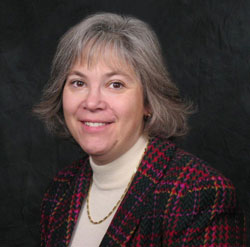
|
|
Elise Kohn, M.D., Internist and Medical Oncologist, Head, Molecular Signaling Section, Laboratory of Pathology, Chair, Gynecologic Oncology Faculty, Head, Medical Ovarian Cancer Clinic, Center for Cancer Research, National Cancer Institute (NCI), National Institutes of Health (NIH)
|
1. I chose this career because...
2. My typical workday involves...
3. What I like best/least about my work...
4. My career goals are...
5. When I'm not working, I like to...
|
|
1. I chose this career because...
|
Back to Top

|
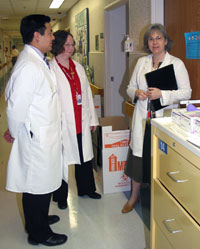
|
|
Elise Kohn, Virginia Kwitkowski and Edwin Posadas stand outside a patient’s room while they complete daily rounds on patients involved in their clinical trials.
|
I chose to become an internist because I have always been interested in medicine, and at an early age, decided I wanted to be a doctor.
In undergraduate school, I was exposed to research and loved it. I was a summer student at NCI the summer before medical school and the first summer during medical school. I had the science bug at that point. As a summer student, I worked with scientists and not clinicians. I was able to see the impact of science through their eyes. One of the then NCI fellows became an assistant professor at my medical school and I worked with him there. This confirmed my interest in the biology of cancer. I applied to NCI for my oncology training and the chance to get more exposure to science. When I got to the lab, a senior scientist, now emeritus, asked me how long I was staying. I told him, with a laugh, “as long as I am having fun or when I find out I cannot succeed.” Either I have blinders on, or all has gone reasonably well. I am a tenured section chief with no immediate signs of leaving. NCI is a great place.
My parents told me I could do whatever I tried and that I should not miss an opportunity for lack of trying. My teachers encouraged my love of science and medicine. My scientific and clinical mentors in medical school, at NCI, and in my scientific communities continue to support and encourage me. I especially thank Dr. Liotta, now my branch chief, friend, collaborator and peer.
Education, Specialized Training and Board Certification
- Bachelor of Science, Cell and Molecular Biology with High Honors, University of Michigan, Ann Arbor, Michigan
- Doctor of Medicine, University of Michigan Medical School, Ann Arbor, Michigan
- Internship and Residency, Internal Medicine, University of Michigan Hospitals, Ann Arbor, Michigan
- Internal Medicine Certification, American Board of Internal Medicine (http://www.abim.org/)
- Medical Oncology Fellowship, National Cancer Institute, National Institutes of Health, Bethesda, Maryland
- Medical Oncology Certification, American Board of Internal Medicine
I am an internist with specialized training and board certification in medical oncology. To be a board certified oncologist requires internal medicine residency training and board certification followed by 3 years of additional specialized training and boards. Certification for internal medicine and its subspecialties is granted through the American Board of Internal Medicine. The American Society of Clinical Oncology (ASCO, http://www.asco.org/ac/1,1003,_12-002138,00.asp) and the American Association for Cancer Research (AACR, http://www.aacr.org/) are the professional societies of medical oncologists.
|
|
2. My typical workday involves...
|
Back to Top

|
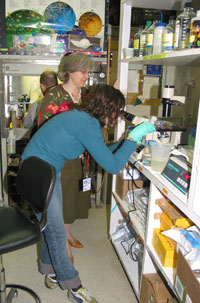
|
|
Elise Kohn and JoAnne Czechowicz examine cells under the microscope.
|
My typical workday includes major responsibilities in the clinic and the laboratory, which are to:
- One of my clinical trials is designed to monitor women who have an advanced stage of ovarian cancer and are in their first remission (cancer that has gone below the level of detection and may be gone for good). At each visit, we take patient blood samples. We use those samples to try to develop a blood test to detect ovarian cancer recurrence.
- We also have a phase I trial of a new combination of the drugs sorafenib and bevacizumab (Avastin). It is the first time this experimental combination of drugs has been tested together as a therapy. This trial is designed to identify risks of the drug combination and observe potential benefits. A phase I trial is about safety first, and benefit second. We are very attuned to safety issues, including toxicity type, severity and amelioration. Both drugs are known to have some of the same toxicities, so it is especially important to monitor the time it takes to develop toxicity, and its severity by dose. Both agents are known to have some benefits and are moving towards, or already have, FDA (Food and Drug Administration, http://www.fda.gov/) approval. This study allows us to provide important information to other physicians who plan to use this treatment for their patients. They will know what to look for, both good and bad. In the second part of the trial, we are applying state-of-the-art proteomic analysis (http://newscenter.cancer.gov/newscenter/benchmarks-vol2-issue2/page2) of tissue biopsies. These results may allow us to better understand how the drugs work, and how they work together.
- Present clinical trials results - I present results formally in the clinic and at major scientific meetings both nationally and internationally. In addition, our results are presented to the public through publication in professional journals and in discussions with patients, advocacy groups, the NCI staff and other scientists and medical professionals.
- Teach clinical fellows - I have formal teaching lectures on Monday mornings to discuss gynecologic cancers and molecular therapeutics. A more informal teaching takes place in the clinic as we see patients and accrue patients to our clinical trials. Further, we have teaching rounds as part of our inpatient program for both our clinical fellows and other clinical staff. Fellows and others always have the opportunity to learn by observation. That is a very important opportunity.
- Laboratory research and oversight - I meet with my laboratory members to discuss their projects, manuscripts, continuing education, and career development. My laboratory staff is currently composed of 8 members with varying backgrounds. Typically, we have up to 4 additional members during the summer and school year. Last summer, we had 5 summer students at both the high school and college levels. This academic year, I will have 3 additional students - two in the NIH Clinical Research Training Program (http://www.training.nih.gov/crtp/index.asp), and one in the HHMI-NIH Research Scholar’s Program (http://www.hhmi.org/research/cloister/).
- Attend and participate in various meetings – Meetings may be related to administrative or clinical duties, protocols, projects, collaborations, or for mentoring.
- Mentor - I mentor anyone who will let me. Learning is such a dynamic process. I am constantly learning while trying to share my knowledge with younger colleagues. At the same time, I am learning from my mentor who is also my Lab Chief, peer, collaborator, and friend. How do I mentor? I am myself, invite participation, explain why, what, and how I do what I do, answer questions, and take the time to enjoy working with my colleagues.
|
|
3. What I like best/least about my work...
|
Back to Top

|
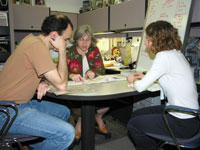
|
|
Elise Kohn meets with HHMI/NIH research scholar and Harvard medical student Elizabeth Guancial and Jareer Kassis, a senior post-doctoral fellow, to discuss research data and plan further laboratory experiments.
|
What I like best about my work is that I think I can make a difference in the lives of people through my work. I like the fact that through teaching and mentoring, I can share my enthusiasm for what I do.
What I like least about my work is time spent in meetings that might be spent improving patient lives, scientific progress, or mentoring. I get impatient when I think I can use my time more productively, but I try not to let it get me down.
|
|
4. My career goals are...
|
Back to Top

|
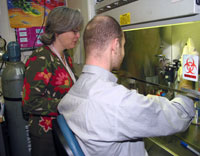
|
|
Elise Kohn looks on as Nick Devoogdt works with living cells in a sterile environment.
|
My career goals are to have it said when I am long gone that I made a difference either for a patient, a colleague, or a peer. That in some way I helped make cancer a more survivable process with an improved quality, and hopefully also quantity, of life. And, that through all of this, I was a good mother and wife and friend.
|
|
5. When I'm not working, I like to...
|
Back to Top

|
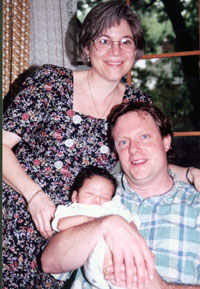
|
|
A family photo of Elise Kohn, her husband and son.
|
When I’m not working, I am a mom and wife and friend. I have a 5-year-old son who is an active, outgoing, loving soul who keeps me on my toes, and a wonderful husband of 21 years.
|
|
|
|
 |